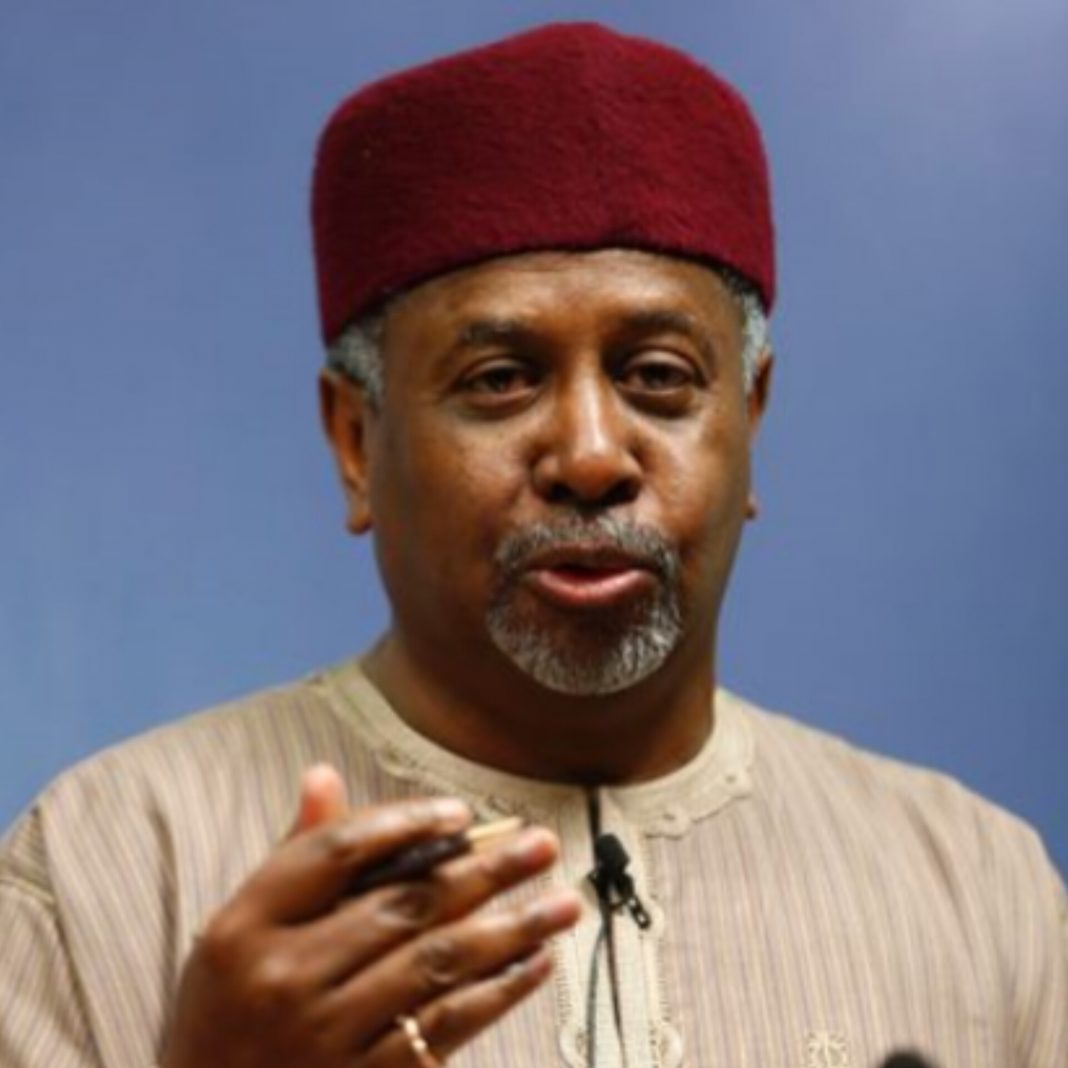...To get all news updates, Join our WhatsApp Group (Click Here)
Also Join our WhatsApp Channel (Click Here)
More facts have emerged on how
former National Security Adviser Sambo Dasuki, invested millions of dollars in American luxury real estate.
A new report released by the Platform to Protect Whistleblowers in Africa (PPLAAF) uncovered this.
Dasuki was previously charged with diverting billions of Naira meant for the fight against Boko Haram insurgents during former President Goodluck Jonathan’s administration.
The PPLAAF report stated that tens of millions allegedly misappropriated by Dasuki ended up funding luxury properties in Los Angeles, California, and McLean, Virginia, a wealthy suburb of Washington, DC.
PPLAAF stated that it examined thousands of pages of property deeds, corporate filings, bank records, and court documents from both Nigeria and the U.S., tracing funds to high-end properties purchased by Dasuki’s close associates, Robert and Mimie Oshodin.
The report stated that records indicate that the Oshodins received at least $27 million from Dasuki’s office and invested similar sums in U.S. real estate.
“Our investigation shows how the fight for accountability in Nigeria is undermined when nations like the U.S. ignore corruption. It’s a grave issue when those entrusted to protect citizens siphon public money for personal luxury,” stated Jimmy Kande, PPLAAF’s West Africa Director.
“The U.S. can and should do more, both morally and legally,” Kande added.
Recall that in 2018 under former President Muhammadu Buhari, Nigerian authorities alerted the U.S. Department of Justice about the allegations involving Dasuki and the Oshodins, urging them to track the money trail. Despite this, the Oshodins continued to acquire and sell properties.
Lanre Suraj of the Human and Environmental Development Agenda (HEDA), expressed outrage saying, “It’s sickening that funds meant to fight terrorism and protect Nigerians were diverted for the opulent lifestyles of a few.
“This investigation should urge Nigeria and the U.S. to recover these assets for the Nigerian people.”
Dasuki, appointed National Security Adviser in 2012 under then-president Goodluck Jonathan, was tasked with coordinating the response to Boko Haram’s insurgency, which caused widespread violence and displacement in Nigeria and neighboring countries.
Nigerian authorities allege that through fake procurement deals and dubious contracts, Dasuki embezzled over $2 billion intended for the anti-terrorism campaign.
After Muhammadu Buhari took office in 2015, Dasuki was dismissed and later arrested in connection with the scandal, often called “Dasukigate.”
As part of its investigation, PPLAAF said it identified multiple assets linked to the Dasukigate scandal.
Soon after Dasuki’s 2012 appointment, he began transferring large sums to the Oshodins, who were acting as legal guardians to two of his children in the U.S. During this period, the couple invested around $24 million in U.S. real estate, often coinciding with transfers from Dasuki’s office.
The largest transaction was the purchase of a $9.5 million Los Angeles mansion on the same day Dasuki’s office transferred $12 million to the Oshodins’ furniture business in Nigeria.
Court filings obtained by PPLAAF indicate that the Oshodins stored tens of millions in jewelry, including a ring valued at over $3 million, along with expensive furnishings and antiquities, in their Los Angeles mansion.
Although the Nigerian authorities informed the U.S. of the allegations in 2018, the Oshodins continued their real estate dealings and still own properties valued at $20 million in Los Angeles and McLean.
Nigeria’s investigation into the Oshodins suggests serious gaps in U.S. oversight of illicit financial flows in real estate.
Recently, the U.S. has strengthened measures to curb such flows, requiring investment advisers and real estate professionals to report all cash purchases by companies and trusts.
However, Nigeria continues to face challenges in recovering assets and prosecuting cases tied to Dasukigate, with persistent coordination and judicial delays. The Dasukigate scandal remains a critical test of Nigeria’s commitment to combat corruption.
Meanwhile, a stately mansion worth $2.8 million in McLean, Virginia, has become the subject of intrigue after reports connected its owner to a sprawling corruption scandal involving Nigeria’s former national security adviser.
The luxurious property, nestled at the end of a private drive and featuring amenities like a climate-controlled wine cellar, sauna, and four fireplaces, seemed to blend seamlessly with the wealth of the Washington, D.C., suburbs — until questions arose about its elusive owner.
Neighbors recall that the man, who introduced himself briefly upon purchasing the home, quickly vanished, leaving the grand, nine-foot carved-wood doors tightly shut, The Washington Post reports following the report of a fresh investigation shared with it by the Platform to Protect Whistleblowers in Africa (PPLAAF).
Within this upscale McLean neighborhood, called The Ridings, properties are typically owned by successful professionals, including a plastic surgeon, a corporate lawyer, and the CEO of a defense consulting firm, according to local property records.
Yet the man’s sudden disappearance left some neighbors wondering what was happening within the grand residence.
According to Nigerian court filings, the mansion’s owner, a family friend of Nigeria’s former national security adviser, is alleged to have been involved in laundering funds misappropriated from the Nigerian government.
The country’s authorities accuse the former security adviser of siphoning off over $2 billion, a portion of which was allegedly routed to the mansion’s owner.
U.S. properties — like the McLean mansion and other high-end residences — are suspected to be among the assets purchased to launder the misappropriated funds.
Further deepening the intrigue, the owner of the McLean property was also linked to a separate incident involving an insurance claim for jewelry theft from another luxurious property near Beverly Hills, California.
The combined allegations have painted a complex portrait of wealth and scandal, connecting the quiet Virginia neighborhood to an international web of alleged financial crime.
The Washington Post reports that the allegations against him highlight a growing global concern: the U.S. real estate market has become a refuge for corrupt officials and criminals worldwide to hide illicit funds through opaque shell companies.
Next year, the Financial Crimes Enforcement Network at the U.S. Treasury Department will implement a new rule that mandates title companies and other parties to gather information on specific real estate sales, focusing on transactions where the buyer is a trust or another legal entity that pays in cash.
“With many American neighborhoods facing affordable housing crises, stopping dirty money from entering the residential real estate market is more crucial than ever,” said Bradley T. Smith, the Treasury Department’s acting undersecretary for terrorism and financial intelligence, in a statement to The Washington Post.
In reporting this story, The Washington Post received court documents, property records, and analyses from the Platform to Protect Whistleblowers in Africa, a Paris-based anticorruption group.
The Premium Times, a Nigerian news organization, was also involved in a broader investigation into real estate money laundering. The Post verified and supplemented the information independently.
To a visitor, the quiet McLean cul-de-sac would appear ordinary, with its private drive, manicured lawns, and neatly trimmed rosebushes. But behind its doors, Nigerian law enforcement officials allege, lies a story of embezzlement, corruption, and global money laundering.
In 2014, in the northeastern town of Chibok in Nigeria, terrorists known as Boko Haram stormed a boarding school and abducted 276 schoolgirls.
The incident sparked the global #BringBackOurGirls movement, supported by Reese Witherspoon, Michelle Obama, and Pope Francis.
Meanwhile, the kidnapping drew international attention to Boko Haram, an insurgency using violent tactics to impose strict Islamic law across Nigerian society.
Bob Oshodin, an 83-year-old entrepreneur, developed his carpentry skills at a young age in Nigeria, as stated in his bio on the archived website of his furniture manufacturing company, Bob Oshodin Organization Limited.
Interestingly, Oshodin formed a lasting bond with Sambo Dasuki, and their friendship spans decades. According to Oshodin’s wife, Mimie, the two became close friends after meeting while living in the United States for extended periods.
The families were close enough that the Oshodins agreed to look after two of Dasuki’s children, then teenagers, who were attending school in the United States while Dasuki served as Nigeria’s national security adviser.
It was also during this time, Nigerian officials alleged, that Dasuki illegally transferred tens of millions
of dollars’ worth of Nigerian and U.S. currency from state funds to the Oshodins’ furniture company.
You can get every of our news as soon as they drop on WhatsApp ...To get all news updates, Join our WhatsApp Group (Click Here)
Also Join our WhatsApp Channel (Click Here)

















